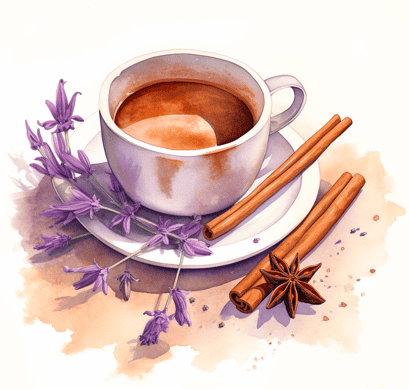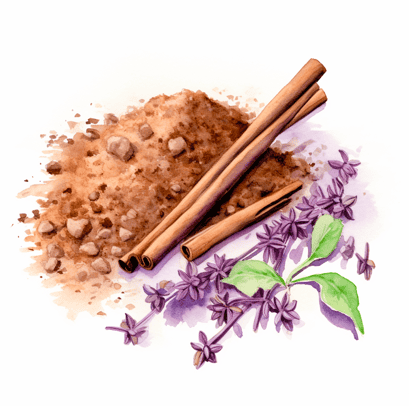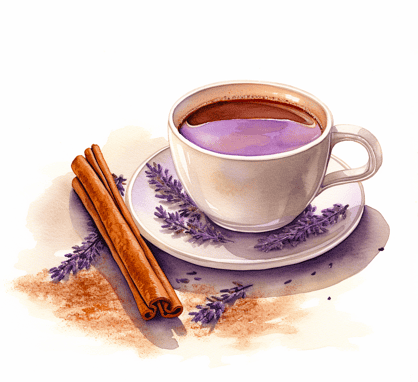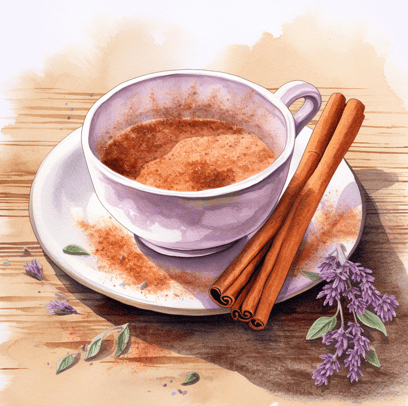
Need a quick fix of warming cinnamon? I’ll show you how to make cinnamon tea with cinnamon powder, a really simple recipe that promises warmth, comfort and more glowing skin.
Hi, I’m Hazel
I gave up on skincare after years of issues with acne and sensitive skin.
But after going plant-based, my skin cleared up and even started to glow. Now I help women reveal their natural beauty with simple, delicious plant-based food.
I also used to be a nurse, and love nerding out on nutritional science (high-quality science, that is).

As usual, this post is based on the strongest nutritional evidence I could find with a focus on the simplest, most delicious foods
…because who has time to waste on anything less?
The quick version:
To make cinnamon powder tea, simply boil a cup of water and stir in a teaspoon of cinnamon powder. Let it steep for 3-5 minutes, then strain into a cup.
This tea is rich in antioxidants that help protect the skin from premature aging and reduce inflammation, promoting a healthy, glowing complexion.
Why Cinnamon Tea?
Whether you’re using cinnamon powder or steeping Ceylon cinnamon sticks, each sip brings you closer to achieving that natural skin glow.
Unlock the Secret to Radiant Skin

Cinnamon tea isn’t just a treat for your taste buds; it’s a boon for your skin.
By reducing your body’s glycemic response by up to 40%, they fragrant cinnamon tea helps prevent the collagen breakdown that leads to wrinkles and skin sagging (1).
Plus, it significantly reduces inflammation, especially when you choose Ceylon cinnamon over ordinary cassia cinnamon (2).
A Burst of Antioxidants in a Cup
Did you know adding just a half teaspoon of cinnamon to your tea boosts its antioxidant content and ability to fight free radicals dramatically (3)?
Both Ceylon and cassia cinnamon enhance the antioxidant capacity of your bloodstream, which combats free radical damage and promotes a healthy, youthful complexion.
This makes a cup of cinnamon tea not just delicious but also incredibly beneficial for maintaining vibrant skin.
You may also like:
Brewed Beauty: Is Black Tea Good for Acne?
Choosing the Right Cinnamon

There are two main types of cinnamon you’re likely to find when shopping, which are Ceylon cinnamon and Cassia cinnamon.
Ceylon cinnamon, also known as true cinnamon, originates from Sri Lanka and is celebrated for its mild, sweet flavour and low coumarin levels. Coumarin is a natural compound that can be harmful in large doses, potentially causing liver damage and other health issues (4).
In contrast, cassia cinnamon is the type most commonly found on grocery store shelves.
It comes primarily from China and other parts of Asia. Cassia is generally more affordable and has a stronger, more robust flavour than Ceylon. It’s the variety most frequently used in cooking and baking across North America and Europe. However, it contains higher levels of coumarin, which can be problematic with excessive intake (4).
Why Choose Ceylon for Your Tea?
Opting for Ceylon cinnamon in your tea is crucial if you consume cinnamon regularly and are concerned about the health risks associated with large doses of coumarin.
Its low coumarin levels make it a safer choice for daily consumption.
While Ceylon cinnamon might be harder to find and more expensive than cassia, its health benefits are significant, especially for those who are mindful of preventing excessive intake of coumarin.
Consuming only small amounts of cassia can mitigate some risks, but for frequent use, Ceylon is the safer, healthier option.
You may also like:
How Detox Tea Endangers Your Liver, and Your Life
Making Homemade Cinnamon Tea with Cinnamon Powder
Whip up this cozy drink up in just a few minutes.

Ingredients:
- 1 teaspoon of ground cinnamon powder
- 1 cup of water
- Optional: Honey or plant-based milk for some extra sweetness and creaminess
Instructions:
- Boil the Water: Heat water in a small saucepan (or tea kettle) until it reaches a rolling boil.
- Add Cinnamon: Stir in the cinnamon powder into the boiling water. Lower heat to a simmer. Adjust the amount to taste if you prefer a stronger or milder flavour. If you’re using a tea kettle, stir both together in a cup.
- Let It Steep: Let the tea steep in the hot water for 3-5 minutes, depending on how strong you like your tea.
- Strain and Serve: Strain the mixture into a cup. If desired, enhance the flavour and health benefits by adding a splash of almond milk or a pinch of nutmeg.
- Sweeten: Optionally, sweeten your cup of cinnamon tea with maple syrupor your preferred sweetener to taste.
Enjoy this warm, soothing cup of cinnamon tea, perfect for any part of your day!
Other Varieties of Cinnamon Tea
Why not experiment with different varieties of cinnamon?

Each type of cinnamon offers unique benefits and flavours. Mixing Ceylon cinnamon sticks with cinnamon bark can enhance your tea’s complexity and cinnamon flavour.
Or add some other warming spices like a dash of ginger or a whole clove for a deeper, comforting flavour on cold days.
Add a Tea Twist
Incorporating other teas can transform your cinnamon tea into a multifaceted drink.
Try adding black tea, oolong tea, green tea or even your favourite herbal tea for an extra antioxidant boost. Each addition not only diversifies the flavour but also amplifies the health benefits.
Creamy Delights
For a more indulgent version, whip up a sweet cinnamon milk tea. Use warm milk—plant-based milk works great here—to create a creamy, soothing beverage that feels like a hug in a cup.
By adding these extra skincare boosting ingredients, you’ll not only enjoy a delicious tea but also reap significant beauty and health advantages.
When to Enjoy Your Cinnamon Tea
Morning Antioxidant Boost
While cinnamon tea is often celebrated for its blood sugar management properties, it’s important to note that most of these benefits have been observed with cassia cinnamon (the high coumarin type), not Ceylon cinnamon (the safer type).
Recent studies have put Ceylon cinnamon to the test and found that unfortunately it does not have the same blood sugar-lowering effects as cassia (5).
However, switching to Ceylon cinnamon is recommended due to its lower levels of potentially harmful compounds, as advised by European health authorities (5).
Ceylon cinnamon still offers a wealth of antioxidants, making a cup of cinnamon tea a great choice for a morning boost.
Moderation is Key
Enjoying your cinnamon tea in moderation is essential, especially if using cinnamon bark or different types of cinnamon.
To maintain health benefits while minimising risks, stick to about a half teaspoon to one and a half teaspoons daily. This amount ensures you gain the antioxidant benefits without the concerns associated with higher coumarin levels found in cassia varieties.
By timing your tea consumption thoughtfully and choosing your cinnamon wisely, you can enjoy both the flavour and the health benefits of this ancient spice safely and effectively.
Conclusion
Discovering how to make cinnamon tea with cinnamon powder is more than just learning a simple recipe; it’s about adopting a lifestyle that prioritises your natural beauty and health. This fragrant cinnamon tea recipe is not only a delightful treat but also a powerful source of antioxidants, which play a crucial role in maintaining a youthful and vibrant complexion.
References
Most references below will link to the original peer-reviewed study itself. However, sometimes I will link to a video over at NutritionFacts.org instead, which is by far the single best resource of brutally transparent nutritional evidence you will ever see. Dr Greger tells a great story about the realities of the science and if I think you will benefit more from one of his videos, the link will take you there instead.
Happy nerding!
- Azzeh FS. Synergistic effect of green tea, cinnamon and ginger combination on enhancing postprandial blood glucose. Pak J Biol Sci. 2013;16(2):74-79. doi:10.3923/pjbs.2013.74.79
- Vallianou N, Tsang C, Taghizadeh M, Davoodvandi A, Jafarnejad S. Effect of cinnamon (Cinnamomum Zeylanicum) supplementation on serum C-reactive protein concentrations: A meta-analysis and systematic review. Complement Ther Med. 2019;42:271-278. doi:10.1016/j.ctim.2018.12.005
- Carlsen MH, Halvorsen BL, Holte K, et al. The total antioxidant content of more than 3100 foods, beverages, spices, herbs and supplements used worldwide. Nutr J. 2010;9:3. Published 2010 Jan 22. doi:10.1186/1475-2891-9-3
- The Safer Cinnamon at NutritionFacts.org
- Update on Cinnamon for Blood Sugar Control at NutritionFacts.org